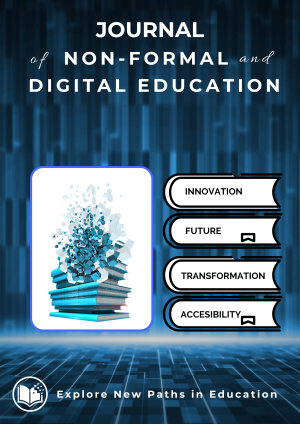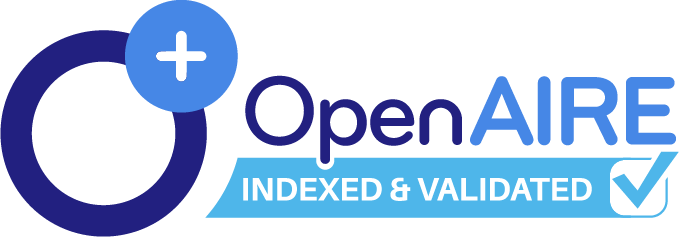Artificial intelligence competence needs for youth workers
DOI:
https://doi.org/10.63734/JNFDE.01.01.007Keywords:
Artificial intelligence, Youth work, Competence framework, Non-formal education, Digital capacity-buildingAbstract
This work addresses the increasing need for youth professionals to acquire competencies that enable the meaningful integration of Artificial Intelligence (AI) into non-formal and formal educational contexts. Against the backdrop of accelerated digital transformation, youth workers in Europe face challenges in understanding, adopting, and ethically applying AI technologies. This work, undertaken within the framework of the Erasmus+ co-funded initiative Artificial Intelligence for Youth Work (AI4YouthWork), seeks to define the requisite knowledge, skills, and attitudes for responsible AI use in youth work settings.
The research followed a mixed-methods design, combining desk research, policy analysis, and empirical data collection through semi-structured interviews and focus groups involving youth workers from Italy, Romania, Greece, and Portugal. The findings informed the development of an AI Competence Framework and the validation of targeted educational resources.
The analysis revealed significant variability in AI awareness among youth professionals, accompanied by uncertainty regarding ethical implications and practical implementation. The validated competence framework captures four critical dimensions: technical under- standing of AI, ethical reasoning, human-centred application, and the societal and environmental implications of AI. Complementary outputs include a multilingual eLearning catalogue (com- prising 48 open educational resources) and a practical training toolkit with curated AI tools and youth-focused workshop templates.
This work contributes to the digital capacity-building of youth professionals by offering a structured, scalable model for the integration of AI in youth work. The findings underscore the necessity of embedding AI education within inclusive, ethically grounded, and context-sensitive training strategies. The proposed framework and supporting tools provide a foundation for long-term transformation in digital youth work across Europe.
References
Carretero, S., Vuorikari, R., & Punie, Y. (2017). Digcomp 2.1: The digital competence framework for citizens with eight proficiency levels and examples of use (tech. rep.). Publications Office of the European Union. https://doi.org/10.2760/38842
Council of Europe. (2015). Youth work portfolio. https://www.coe.int/en/web/youth-portfolio
Council of the European Union. (2018). Council recommendation of 22 May 2018 on key competences for lifelong learning (2018/c189/01) [Official Journal of the European Union]. https://eur-lex.europa.eu/legal-content/EN/TXT/PDF/?uri=CELEX:32018H0604(01)
European Commission, Directorate-General for Education, Youth, Sport and Culture. (2022). Ethical guidelines on the use of artificial intelligence (ai) and data in teaching and learning for educators (tech. rep.). Publications Office of the European Union. https://doi.org/10.2766/153756
Evrard, G., Bergstein, R., Knoch, S. B., Nicodemi, S., Di Paola, M., & Hadzibegovic, A. (2023). A competence model for youth workers. https://www.salto-youth.net/downloads/4-17-4385/ETS_Competence_model_Youth_Workers_2023_final_online.pdf
Floridi, L., Cowls, J., Beltrametti, M., et al. (2018). Ai4people—an ethical framework for a good ai society: Opportunities, risks, principles, and recommendations. Minds and Machines, 28 (4), 689–707. https://doi.org/10.1007/s11023-018-9482-5
High-Level Expert Group on AI. (2018). Ethics guidelines for trustworthy AI. https://digital-strategy.ec.europa.eu/en/library/ethics-guidelines-trustworthy-ai
High-Level Expert Group on AI. (2020). Assessment list for trustworthy artificial intelligence (ALTAI). https://digital-strategy.ec.europa.eu/en/library/assessment-list-trustworthy-artificial-intelligence-altai-self-assessment
Holmes, W., Bialik, M., & Fadel, C. (2019). Artificial intelligence in education: Promises and implications for teaching and learning. Center for Curriculum Redesign.
Lanzetta, M., Abbruzzese, G., Acomi, O., Acomi, N., Machado, J., & Maravelaki, S. A. (2024). Artificial intelligence competence needs for youth workers. https://doi.org/10.5281/zenodo.11525357
Livingstone, S., & Helsper, E. J. (2007). Gradations in digital inclusion: Children, young people and the digital divide. New Media & Society, 9 (4), 671–696. https://doi.org/10.1177/1461444807080335
Luckin, R., Holmes, W., Griffiths, M., & Forcier, L. B. (2016). Intelligence unleashed: An argument for ai in education. https://edu.google.com/pdfs/Intelligence-Unleashed-Publication.pdf
OECD. (2021). 21st-century readers: Developing literacy skills in a digital world (tech. rep.). OECD Publishing. https://doi.org/10.1787/a83d84cb-en
Pawluczuk, A. (2023). Automating youth work: Youth workers’ views on AI. https://pjp-eu.coe.int/documents/42128013/116591216/AI_views+of+youth+workers.pdf/93ac326a-cf80-3fa4-c4e5-56ee4038a766?t=1682336763487
Redecker, C. (2017). European framework for the digital competence of educators: Digcompedu (Y. Punie, Ed.; tech. rep.). Publications Office of the European Union. https://doi.org/10.2760/159770
UNESCO. (2021). AI and education: Guidance for policymakers (tech. rep.). UNESCO. https://unesdoc.unesco.org/ark:/48223/pf0000376709
Vuorikari, R., Kluzer, S., & Punie, Y. (2022). Digcomp 2.2: The digital competence framework for citizens (tech. rep.). Publications Office of the European Union. https://doi.org/10.2760/115376
Zawacki-Richter, O., Mar´ın, V. I., Bond, M., & Gouverneur, F. (2019). Systematic review of re- search on artificial intelligence applications in higher education – where are the educators? International Journal of Educational Technology in Higher Education, 16 (1), 1–27. https://doi.org/10.1186/s41239-019-0171-0
Published
Issue
Section
License
Copyright (c) 2025 Journal of Non-Formal and Digital Education

This work is licensed under a Creative Commons Attribution 4.0 International License.
How to Cite
Funding data
-
European Commission
Grant numbers 2023-2-IT03-KA220-YOU-000170929















